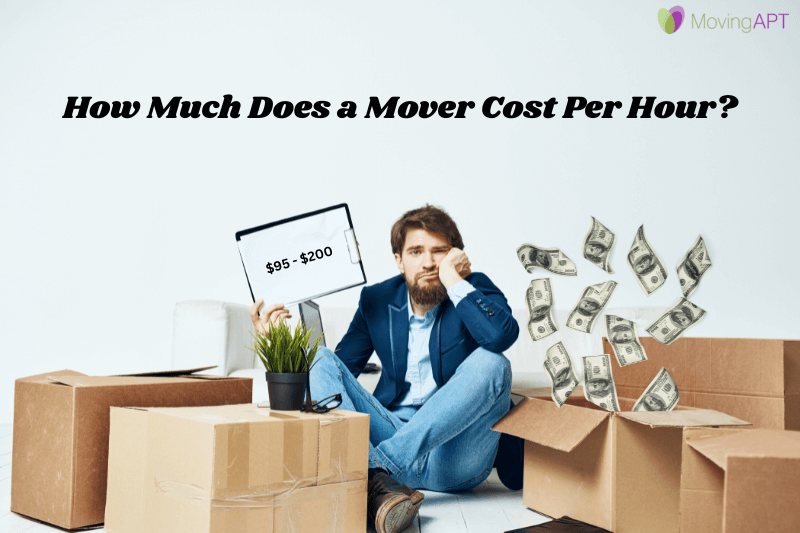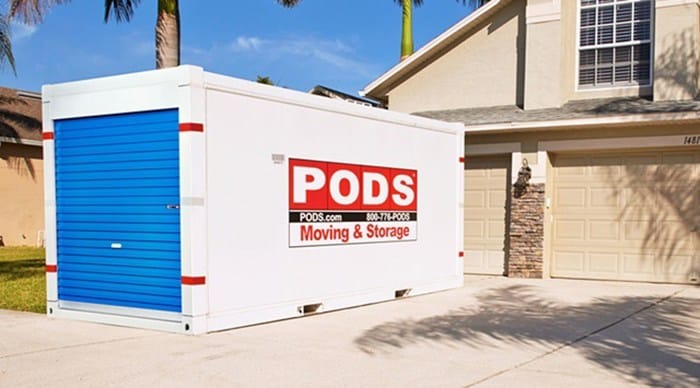| Moving Service | Cost |
| Weight and Distance | Varies by move |
| Time and Number of Movers | Varies by move |
| Long Carries | $75 per every additional 50 feet |
| Elevators | $50 – $100 |
| Stairs | $50 – $100 per flight |
| Parking | $20 – $200 |
| Shuttle Fees | $0.10 to $0.15 per pound, $300 minimum |
| Bulky Items | $150 – $250 |
| Specialty Items | $150 – $500 |
| Assembly and Disassembly | $50 – $200 |
| Insurance | $10 for every $1000 of value, $250 – $500 deductible |
| Packing and Unpacking | $60 per hour |
| Waiting Time | $100 – $300, depending on number of movers |
| Last Minute Moves | $150 – $500 |
| Storage | $0.06 per cubic foot |
| Peak Moving Season | Up to 30% more than usual |
| Gratuity | 15% to 20% of your total price |
| Tax | Variable by state, sometimes up to 10% |
Knowing your budget is a big part of organizing your move, and it’s important to know all the extra fees that you may have to pay.
Fortunately, Moving APT pulled from customer feedback and face-to-face business with the movers in our network to come up with a list of the factors behind your final price.
Read on to learn more about what factors affect the cost of your move, why you may have to pay extra fees, and how you can save some money when booking your movers.
In this article
18 Factors that Affect Moving Costs
Moving is a headache, but hiring local or long distance movers can help ease your stress. Here are some of the major factors that affect moving costs:
1. Weight and Distance
If you’re moving long distance, the weight of your stuff and the distance you’re traveling are the two biggest factors behind the price of your move.
A smaller house or a studio apartment means a lot less stuff than a five bedroom house. Similarly, a move to the next state over means much less traveling than moving from coast to coast.
When calculating the weight and the distance of your move, your movers will send a representative to your place to go over all the details.
The representative will take an inventory of what you’ll have to move, and any challenges that may complicate the job for your moving team. Speaking of complications, do you happen to have an extra long driveway?
Price: Varies
2. Time and Number of Movers
If you’re moving local, the price of your move depends on how much time it takes your movers to haul your stuff. Local moves are anything under 100 miles and within the same state, but keep in mind that traffic times and the commute itself will cost extra money.
Local movers charge per hour, per mover. The general rule of thumb is that each room takes two movers, and each mover will cost anywhere between $25 and $50 apiece. Don’t forget the tip, and don’t forget to tip the driver.
Price: Varies
3. Long Carries
Long carries count as anything over 75 feet, so if you’ve got a long driveway or your apartment building has a lot of hallways to navigate, you may end up paying an extra fee.
Don’t worry – the long carry fee only applies to the distance between the truck and your front door. Long carries fall into an umbrella category we in the moving industry call access fees.
Access fees come into play whenever there are certain hurdles that your moving team will have to navigate.
Your movers will communicate with you about what sort of extra fees you may have to pay – and if they don’t, you should definitely ask them ahead of time to avoid any surprises.
Price: $75 per every additional 50 feet
4. Elevators
Carrying your stuff from your bedroom to your driveway is one thing, but carrying your stuff from an apartment, through a hallway, and then waiting for an elevator before tetris-ing everything into a little box is a bit of a challenge.
Just like long carries, elevators fall into that access fee category. While the whole point of an elevator is to make life more convenient, it’s still an extra step for your movers to deal with.
Elevators also have weight limits, which means multiple trips up and down to avoid accidentally breaking anything.
Price: $50 – $100
5. Stairs
Have you ever had to carry a couch up and down some stairs? What about multiple flights? It’s a tough job, and your movers will have to do it all day. If your movers need to navigate a couple flights of stairs, you’ll have to pay an extra fee.
Just like elevators and long carries, stairs mean an extra access fee. While you may get a little bit of leeway for that first flight, movers will usually add on an extra fee for every additional flight of stairs.
Price: $50 – $100 per flight
6. Parking
Parking is expensive enough for cars, and it certainly stacks up for your moving truck. You’ll have to do more than just pay a parking meter while your truck is parked on a public street: You’ll need to apply for a parking permit from the city, and (like everything else that goes through a public office) you can expect to pay some extra money for the privilege.
Keep in mind, some cities only issue permits for a single day at a time. You’ll need to apply for several parking permits if you’re anticipating your move will take more than one day. And don’t forget to feed the meter for your own car, too!
Price: $20 – $200
7. Shuttle Fees
When you make a big move, your stuff gets loaded up on a semi truck. Unfortunately, it’s a little difficult for a semi truck to park on a crowded city street, and most cities won’t allow it in the first place. Instead, your movers will have to use a shuttle.
Shuttles are smaller trucks that are used to transport your stuff from your semi trailer to your new home. Your trailer will need to be parked at a staging area outside of the city, and your movers will have to go back and forth from the semi to your home with the shuttle. It’s complicated, and the shuttle fee can be pretty steep.
Price: $0.10 to $0.15 per pound, $300 minimum
8. Bulky Items
Moving is an efficiency game. Stackable items are good. They can be rearranged in the truck and easily carried from point A to point B. Unfortunately, the same can’t be said for your bulky items.
If you have a sectional, pool table, piano, or any other kind of big, heavy, cumbersome item around the house, your movers will have to navigate it out of your house, into the truck, and into your new place. Bulky items usually command an additional fee, so plan accordingly.
Price: $150 – $250
9. Specialty Items (Price: PRICE)
When movers talk about specialty items, they’re talking about valuables and heirlooms. Specialty items include antiques and other belongings that may warrant extra care and attention for safe transport.
For example, if you’ve got a grandfather clock or a vintage motorcycle, your movers will need to build a box around it while also lashing it down and packing it to avoid bumping and jostling on the way. Specialty items mean specialty care, and a pricetag to match.
Price: $150 – $500
10. Assembly and Disassembly
You’ll have to pay more for bulky, unsackable items – but sometimes they can be broken down into much more manageable pieces. If you have furniture that can be disassembled, your movers can handle it for an additional fee.
Sometimes, disassembly is essential for protecting your stuff.
Think of that big armchair or your bookcase. The legs on the armchair are fragile, and it’ll be safe if they’re removed and stowed on top of the chair when it’s brought into the truck. And that bookcase can easily tip over or drop its shelves.
Disassembling, or partially disassembling your furniture can prevent a lot of breaks, dings, or cracks – and it makes hauling easier, too.
Price: $50 – $200
11. Insurance
Movers are careful, but there’s always the chance of something getting damaged or lost. Fortunately, movers are required by law to provide insurance coverage for your move.
The bare minimum is 60 cents per pound of stuff, but if you really want peace of mind, you can pay for full coverage insurance, instead.
With full coverage insurance, your movers will reimburse you for the full value of damaged or lost property. However, there’s a catch: They won’t offer full coverage insurance if you did the packing yourself.
If you were planning on just poorly packing your stuff and getting your movers to pay for a new PlayStation after it “accidentally” breaks, tough luck.
Price: $10 for every $1000 of value, $250 – $500 deductible
12. Packing and Unpacking
Speaking of packing, you’ll have to pay extra for packing if you want to get in on that sweet full coverage insurance plan. Professional movers are equipped with all the materials and supplies needed to pack your stuff safely, and you should take them up on the offer.
Packing may be an optional service, but you’ll be thankful you paid a little extra for it. It’s a great way to cut down on your stress, and you won’t have to run down to the post office or office supply store to buy a bunch of boxes and packing peanuts, either.
Price: About $60 per hour
13. Waiting Time
If you keep your movers waiting, you may end up having to pay a penalty. Moving takes a lot of planning and scheduling, and if a client isn’t there to open a door or sign off on a truckload of stuff, it can throw off the scheduling for several other moves throughout the day, week, and month.
The amount you may have to pay for any delays depends on the amount of movers you keep waiting. Fortunately, this additional fee only applies if the delay is caused by the client, rather than the moving truck.
Price: $100 – $300 depending on number of movers
14. Last Minute Moving
Did you wait until the last minute to book your move? It’s a smart idea to book well in advance (think 3 to 6 months) if you want to save money on moving. Otherwise, you may end up paying a premium for movers – and you’ll end up rushing your move and stressing out.
Aside from the financial hit, it’s better to allow yourself plenty of time to pack and get ready for your move. If you give yourself enough time in advance to start packing and getting your affairs in order, the actual day of the move will go smoothly and you’ll already be used to living out of your luggage.
Price: $150 – $500
15. Storage
Moving isn’t always cut and dry. Sometimes you don’t know what day you’ll be arriving in your new town, and sometimes you don’t know if all your stuff will fit in your new place.
Storage is a great option for dealing with these uncertainties, but it comes at a price. A lot of moving companies offer storage, and of those movers, many of those companies offer 30 days free.
However, if you need to pay for more than 30 days of storage, the rates may vary. For a long distance move, you may have to pay about 60 cents per cubic foot.
Price: $0.06 per cubic foot
16. Peak Moving Season
Peak moving season is June, July, and August, and any major holiday is going to result in increased moving costs, too.
Try to avoid any time when students and families are guaranteed to have time off: Christmas break, spring break, summer vacation, and long weekends are all going to command a premium.
Leases run out at the end of the month, so keep in mind the first and last days of the month will be expensive as well. If you’re able to plan your move in advance, shoot for mid-week, mid-month, and far away from peak season.
Price: Up to 30% more than usual
17. Tips and Gratuity
Yes, you should tip your movers. In the moving industry, tips aren’t just accepted, they’re expected. Unless your moving company explicitly declines to accept tips, you should have some money set aside as a gratuity for your moving team.
Our recommendation is to tip about 15% to 20% of the total price of your move, to be divided up across your whole moving crew. They’re doing hard work for you, and they deserve a little extra.
Price: 15% to 20% of your total price
18. Taxes
Finally, there’s always taxes. Most states don’t require movers to charge you for sales tax, but if you have to buy any specialized moving equipment or packing supplies, you may have to cough up a little extra dough.
If you’re unsure about any extra fees you may have to pay, it’s important to contact your movers ahead of time to avoid any last-minute surprises.
It’ll give you plenty of time to adjust your budget accordingly, and it may shed some light on some great ways you can cut down on moving costs.
Price: Variable by state, sometimes up to 10%
Get Ready to Move
You can’t move without planning your budget, and you can’t plan out a budget without knowing about all the factors behind the price of your move. Now that you’re more familiar with what additional services you may need (and how much you may end up paying for them), you can take the next step and start searching for quotes.
Check out our moving cost calculator, and shop around for the best local and cross country movers near you.





